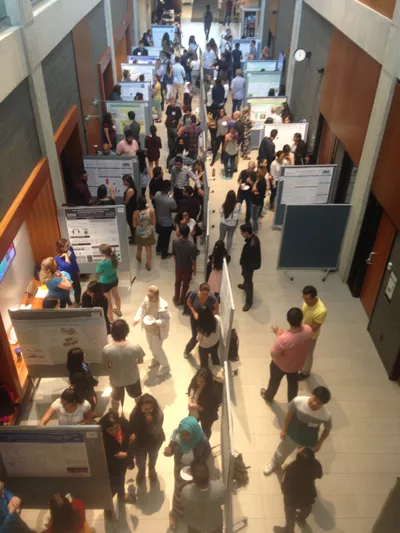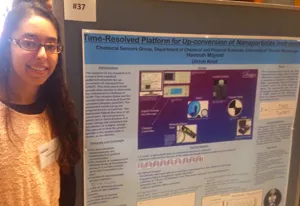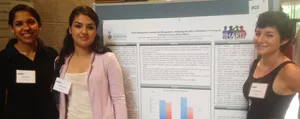
Smarti Gras: A festival of undergrad research at UTM
The rains hammered down on Tuesday morning, but little could dampen the spirit of Smarti Gras, U of T Mississauga’s inaugural undergraduate summer research celebration.
“We did meet with a few obstacles in coordinating Smarti Gras, including a change in venue location and the unfortunate inclement weather that lead to cancelling some of the carnival-inspired activities we had planned,” said Professor Bryan Stewart in his opening remarks for the event, which was co-sponsored by UTM’s Office of the Vice-Principal, Research, the Dean’s Office, UTMAGS, and the UTM Library.
“However the enthusiasm and dedicated participation by the summer undergraduate students has truly invigorated this event.”
The Smarti Gras participants that were highlighted were a mix of students working on research projects over the summer; some were involved with the Research Opportunity Program (ROP) and others were recipients of a U of T Excellence Award or NSERC Undergraduate Student Research Award. There was also a significant representation of graduate students, organized through UTMAGS, who helped coordinate volunteers and lend their support, as well as faculty members from various departments who came to find out more about UTM’s multiple research endeavours. Attendance for Smarti Gras was estimated at roughly 170 people.
The day’s events included oral presentations, a poster exhibition, and a BBQ lunch complete with ice cream, popcorn and a DJ spinning a range of pop music.
In total there were six talks presented from 3rd- and 4th-year students from Biology, Chemical & Physical Sciences, the Institute of Communication, Culture and Information Technology, Political Science, and Visual Studies. The topics covered a vast range of research, from ion channels in Trichoplax adhaerens (an animal that lacks neurons and muscle), to the role of city governments in climate change, and from intergenerational video gaming and seniors, to an overview of art history in museums in Canada.

The poster exhibition was an exceptional showing, with 55 posters from 2nd, 3rd, 4th and 5th year UTM students from several departments, with Hamnah Majeed (pictured) from Chemical & Physical Sciences having the distinction of being the only 1st-year student presenting a poster. Majeed did an impressive overview of her project, Time-resolved Platform for Up-conversion on Nanoparticles Instrument, which was supervised by UTM Principal Professor Ulrich Krull, who was also in attendance at the event.
“I received all the parts to assemble this instrument a few days ago, and finished the chopper blade yesterday, so while I am explaining the conceptual part of the instrument through my poster, I will now be able to assemble it in the upcoming days,” said Majeed.
The up-conversion she is investigating is the process when two or more photons of a lower energy converge into one photon of a higher energy, and this instrument will provide the data needed to determine the luminescence lifetimes of up-conversion nanoparticles, which is the time it spends in the excited state. Despite not having a significant science background prior to coming to UTM, Majeed was a great ambassador for the Chemical Sensors Group and adeptly explained the processes and outcomes involved in her project like a seasoned researcher.

There were also Biology and Chemical & Physical Sciences (CPS) students that teamed up with CPS Professor Marc Laflamme who devised a “Microcosm” Educational Board Game. Incredibly, they developed the game over the course of a six-week period, and aim to roll it out to high school students in the next year or so to make learning about science more fun and interactive.
Smarti Gras has a similar aim in making research more accessible, fun and interactive, and, without a doubt, a reason to celebrate.
For the full agenda, please see the program for Smarti Gras, which the Office of the V.P., Research aims to grow and continue to hold as an annual event.
